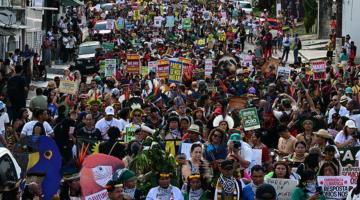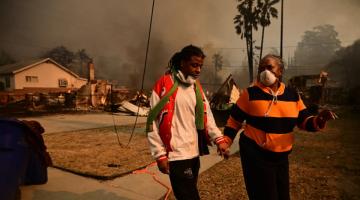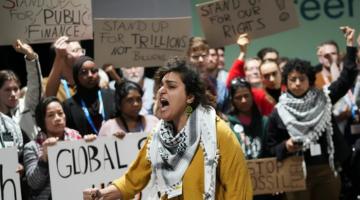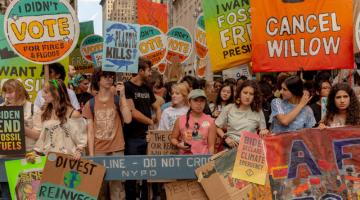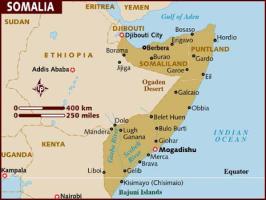“Does any RPEC issues activist seriously think we’ll remedy poverty and build the gargantuan new infrastructure required to address our climate crisis while maintaining a global military presence and footing the virtually limitless bills of a new Cold War?”
Introduction: What’s Really at Stake When We Talk about Climate Justice
This article hopes to connect some crucial dots its author has never seen connected. Namely, to identify the Russiagate narrative as a monstrous sneak attack, conducted chiefly by Democrats, on the very concept of climate justice.
Since no author I’ve read has connected that particular set of dots—by no means difficult to connect—this piece, by pinpointing the Russiagate narrative as the climate justice narrative’s most dangerous enemy, is already performing a simple but crucial public service. But when we consider the real meaning of climate justice—too little understood by “woke” activists, let alone the comparatively stuporous U.S. public—the value of that public service is exponentially amplified. For when we speak about climate justice, we’re really talking about global justice pure and simple—and about saving the whole of human civilization by means of it. A fact underscored by Naomi Klein, probably the preeminent promoter of climate justice, in titling her pivotal book This Changes Everything. It doesn’t get bigger than everything.
“No brief summary of current science, no matter how impeccably documented, is likely to shake most Americans from their cozy, if dangerous, climate complacency.”
Still, readers may find “everything” too abstract to be motivating, and they may suspect alarmist hyperbole in writers claiming “the whole of human civilization” is at stake. However, when we consider that climate crisis is, from here on, a much more accurate description than climate change, and that climate is the central formative feature of humanity’s (and every other species’) habitat, claiming the whole of civilization is now at stake seems hardly overblown. But “everything” remains too big and abstract to wrap one’s mind around. And “mainstream” media (better called “corporate, state-capitalist, or imperialist media”) has so grievously abdicated its responsibility of informing U.S. citizens about humanity’s impending climate peril that no brief summary of current science, no matter how impeccably documented, is likely to shake most Americans from their cozy, if dangerous, climate complacency. If climate change were really such an emergency, they must think, wouldn’t our politicians and media be screaming about it daily?
The fact that they aren’t screaming about it daily underscores not the absence of a climate crisis, but the presence of systemic injustice, which daily worsens that crisis. And while most people may not be “woke” enough to know or care about the systemic injustice crippling climate action, they care—in ever-growing numbers—about the various forms of injustice, say racial and economic, encompassed in the overall injustice of our corrupt political system. So the key task for climate justice activists who know our business is one of translation for U.S. audiences: perhaps abandoning the term climate justice altogether and simply identifying the climate movement as one partner in a hyperpotent “movement of movements” fighting the systemic injustice harming us all.
The same systemic injustice—I hope to prove—perniciously reinforced by the Russiagate narrative.
Reframing the Needed Struggle: RPEC Justice vs. Russiagate
If my title pointed to “climate justice” as the designated (and previously unnamed) target of the giant middle finger thrust by Russiagate, that was only to use the most familiar term available for the composite victim I’m alluding to. But as just noted, “climate justice”—too strongly suggesting the grossly undervalued climate issue (undervalued because “orphaned” by corrupt politicians and media)—is probably the wrong rallying banner for assembling a U.S. “movement of movements” capable of fighting such deeply entrenched injustice. If my title failed to supply an adequate synonym, it’s because no such synonym as yet exists. Inventing it is our task here.
Now, in a sense, humanity itself is the real target for the contemptuous middle finger of the Russiagate narrative. So, in a sense, humanity (considered solely as victim of Russiagate) makes an appropriate synonym for climate justice: if the climate justice movement (which seeks to defend humanity against climate destruction) gets the shaft, then humanity gets screwed too. But while calling the Russiagate narrative a de facto attack on humanity is (for reasons soon to be explained) certainly fair game, defending all humanity is not—and perhaps, from sheer scope, can never be—the organizing principle of any on-the-ground activist movement. We need a rallying banner for a powerful coalition of actual activist movements.
“Humanity itself is the real target for the contemptuous middle finger of the Russiagate narrative.”
The modest proposal here is simply to identify the chief coalition partners by the acronym RPEC (pronounced AR-pec), which stands for Race, Peace, Economics, and Climate. The proposed “movement of movements” (to some extent already in existence, based on ever-growing awareness of intersectionality) would be called the RPEC Justice Movement. What the RPEC acronym lacks in verbal elegance, it makes up for in clearly designating the major movement partners—almost completely orphaned from “mainstream” political discourse—who have a compelling stake in uniting to fight the systemic injustice that so orphans them.
And nothing is a more unjust, Satanic tool for orphaning race, peace, economic, and climate issues from “mainstream” political discourse than the nonstop, wildly overblown blather demonizing Russia for its purported serious attacks on U.S. “democracy.” As if the proposed RPEC Justice Movement partners weren’t keenly aware how little U.S. democracy actually exists—and how incredibly much U.S. democracy’s foremost enemies are domestic corporate oligarchs rather than Russians. My article aims chiefly 1) to deepen their existing awareness of their need to struggle side-by-side against the systemic injustice that makes talk of “U.S. democracy” a cynical joke and 2) to stress their urgent need to join forces to overthrow the lying Russiagate narrative and replace it with a truthful RPEC justice one. (Which is essentially the climate justice narrative adapted for climate-awareness-challenged U.S. audiences.)
Preliminaries: Needed Context for “Grokking” Russiagate
Given this article’s title, readers may feel impatient that I’ve beaten around the bush—in having not yet discussed how Democrats’ Russiagate narrative thrusts a giant middle finger at climate justice. And indeed, I’ve not yet discussed Democrats at all, while discussing the climate justice movement only to pooh-pooh the term, suggesting the inelegant “RPEC Justice Movement” as a more comprehensible rallying flag for U.S. audiences.
While I’ve largely renounced the term climate justice, I haven’t renounced the underlying concept at all; I’ve simply substituted language better calculated to identify the main movement stakeholders in climate justice. Important stakeholders, who might not realize they were stakeholders at all had I simply continued to speak of climate justice. Russiagate is such a dangerous, deeply entrenched, and relentlessly promoted narrative that only a broad coalition movement of justifiably outraged activists can defeat it. To win the current narrative game—really a propaganda war for minds and hearts—it’s crucial to identify all potential warriors who have skin in this “game.” In other words, all the race, peace, economic, and climate activists (as well as the non-activists and potential activists they’re defending) being royally screwed by Russiagate.
“Russiagate is such a dangerous, deeply entrenched, and relentlessly promoted narrative that only a broad coalition movement of justifiably outraged activists can defeat it.”
So, why should RPEC activists (and the people they’re defending—ultimately, all of humanity—be furious with Democrats over Russiagate? After all, Trump and Republicans—and through them, ultra-sinister Republican oligarchs like the Koch brothers—are the ones now wielding power and wreaking untold havoc on our democracy and planet; indeed, the Jeffrey Sachs article just cited refers to Trump as the “evil” Koch brothers’ “shameless factotum.” If Trump and Republicans are so hideously awful, why should we RPEC activists be so furious with Democrats—and their supporting media—for perhaps exaggerating certain Russians’ documented attempts to interfere in U.S. politics?
Our grounds for justified fury with Democrats over Russiagate are rooted in Democrats’ sinister role—in a system with only two viable parties—as the Inauthentic Opposition Party. Or, in a related insightful framing, as Good Cop to Republicans’ Bad Cop. The common theme in these two related analyses is that Democrats can’t offer genuine, principled opposition to Republicans’ very genuine badness because the two parties serve intersecting sets of corporate interests and oligarchs—many of whom hedge their bets by donating to both parties. And while Democrats’ controlling oligarchs tend to be more high-tech, modern, and socially enlightened, both parties reliably play boot lackeys to the military-industrial-surveillance complex.
“The two parties serve intersecting sets of corporate interests and oligarchs.”
One convenient shorthand for describing the chief interests controlling both parties is to say that they serve Wall Street and War Street—“Wall Street” standing for more purely economic interests, and “War Street” for the military-industrial-surveillance complex (alongside influential militaristic foreign-state-based donors like the Israeli and Saudi lobbies). And almost needless to say, Wall Street and War Street interests are closely related and mutually reinforcing: Wall Street provides financing, manufactured components, and services that War Street relies on; War Street, in turn, provides military muscle to enforce Wall Street agendas, as well as endless investment opportunities for Wall Street dollars. So, when it comes to exercising political muscle, Wall Street and War Street are far likelier to collude than conflict. Which, of course, only worsens the problem of exercising democratic control over either.
Wall Street and War Street utterly dominate both parties; outside of mentioning that Democrats (for complex historical reasons) tend to have more enlightened big-bucks donors and a more enlightened voting base, little more analysis is needed. Democrats’ more enlightened donors and base are the chief reason Dems must act the Good Cop in the Good Cop, Bad Cop pair; Republicans’ base responds more favorably to authoritarianism, militarism, rejection of science, and social Darwinist cruelty. Only, it must be added—a crucial factor in understanding Russiagate—that neither party’s base (since the military draft was abolished) frets much about murderous, wasteful foreign military adventures. The vaunted progressivism of Democratic Party voters generally ends at America’s shores.
Cutting to the Chase: How Russiagate Screws RPEC Justice Activists—and Humanity
Understanding Democrats’ role as the Inauthentic Opposition Party—the Good Cop to Republicans’ Bad Cop—has at last prepared us to understand why Democrats’ party bigwigs and supporting corporate media insist so obsessively on Russiagate. Insist, in fact, despite the Russiagate narrative flatly contradicting the climate justice narrative and spelling a likely death sentence for human civilization. And insist despite Russiagate requiring thwarting the aspirations of racial and economic justice, peace, and climate-action supporters who form a significant portion of Democrats’ actual or potential base.
Quite simply, Democrats’ “Good Cop” role—played while performing yeoman service for Wall Street and War Street—requires either betraying, hoodwinking, or “guilting” the more enlightened, progressive part of the party base. Actual service of that base must be kept to an absolute minimum: only whatever pittances Wall Street and War Street, playing their zero-sum game against democracy, will allow.
So, Russiagate is simply the latest in the Democrat Good Cop’s bag of tricks, artfully designed for the special circumstances of a Trump presidency. And designed, needless to say, to hoodwink the more enlightened, progressive—and non-oligarchic—part of the party’s actual or potential voting base. Russiagate brilliantly (and sleazily) exploits several convenient Trump vulnerabilities to construct a plausible (if phony) tale of Trump as Vladimir Putin’s puppet—when he’s almost demonstrably (and far more dangerously) a boot lackey for the Koch brothers and Netanyahu. Among those vulnerabilities are his family history of shady business dealings with Russia, his seeming infatuation with Putin, and his expressed longing (in his candidate and early presidential days) for a better U.S. relationship with Russia.
“The genius of Russiagate that it allows Democrats to appear the Good Cop by joining in the totally justified progressive loathing for Trump.”
What makes Russiagate so plausible—and therefore, such a powerful tool for hoodwinking Democrats’ progressive base—is not simply Trump’s Russia-related vulnerabilities, but the fact that progressives already have so many other compelling reasons for loathing Trump. With Trump already loathed by Dems’ progressive base on so many good grounds, why not promote loathing for him on bad—but convenient and plausible—grounds? Why not, indeed? And it’s precisely the genius of Russiagate that it allows Democrats to appear the Good Cop by joining in the totally justified progressive loathing for Trump—moreover, on plausible grounds) while sidestepping urgent party reform and promoting abominable policy.
So sinister is the seduction of the Russiagate narrative that only those with a powerful, principled master narrative—like black leftist Glen Ford of the Black Agenda Report—are capable of perceiving just how abominable in policy terms the Russiagate story is. Ford is worth quoting: “We are enveloped in a toxic miasma of Russia-hate that, by sheer weight and repetition, has infested every aspect of American political thought...Voices for peace and social justice are asphyxiated in the pestilential plume—unless they find their own air.” Ford, like other BAR writers, brings a witness—an ability to connect the dots between intrinsically allied issues—that honors the deliberately buried radical legacy of Martin Luther King.
The climate justice narrative, updated to include a climate issue that didn’t exist in Dr. King’s day, brings a principled leftist narrative nearly identical to BAR’s to its assessment of Democrats and Russiagate. Like Dr. King, we see the urgency of racial, peace, and economic justice activists—along with the new contingent of climate activists—uniting in a powerful, timely intersectional movement. Climate justice or RPEC justice, any comprehensible, mutually acceptable name will do. But we do not think such a movement will succeed as long as it lets its voice be crowded out by the lying Russiagate narrative, where never-substantiated “Kremlin” hacks of the DNC are irresponsibly declared “acts of war.” Does any RPEC issues activist seriously think we’ll remedy poverty and build the gargantuan new infrastructure required to address our climate crisis while maintaining a global military presence and footing the virtually limitless bills of a new Cold War?
One can only hope movements like the current Poor People’s Campaign, leaning so wisely toward an intersectionality like Dr. King’s, will step up and denounce the Russiagate narrative for the virtually endless harm it does our RPEC cause.
Patrick Walker can be reached at: pjwalkerzorro@yahoo.com

